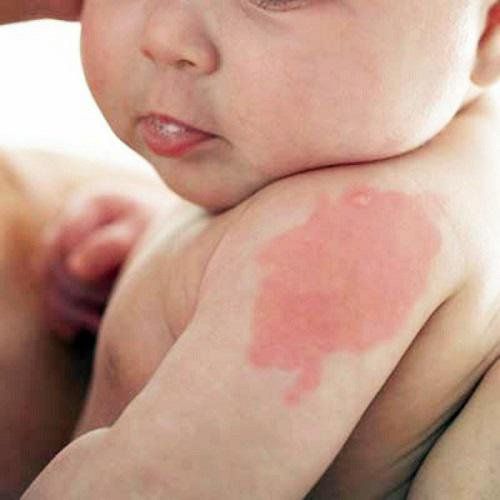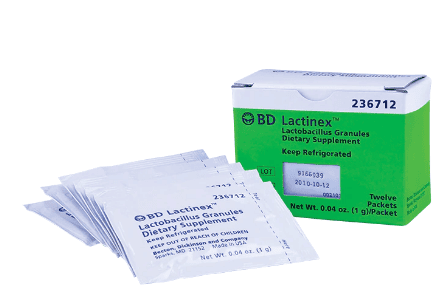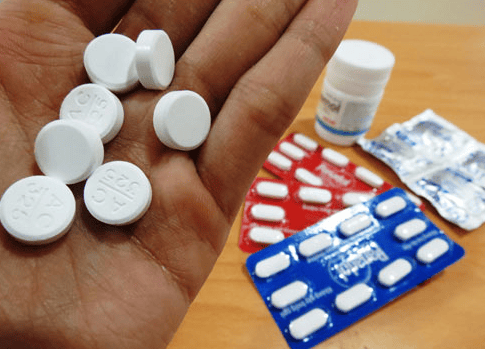This is an automatically translated article.
Food allergies are on the rise, so it's only natural to wonder about the potential harm to your child. While reactions to foods can be serious, it's important to know the facts and what you can do to help reduce your child's risk.
1. What is a food allergy?
A food allergy occurs when the immune system attacks a food protein that it mistakes as a threat to the body. Symptoms may include itching or swelling of the mouth, throat, face, or skin; shortness of breath; and stomach pain, diarrhea, nausea or vomiting. Severe food allergies can be life-threatening.
To confirm a food allergy and avoid unnecessary dietary restrictions, a diagnosis should be made by a physician. You should not diagnose yourself or your child with a food allergy. The only way to prevent a food allergic reaction is to completely avoid the food and any product that may contain its ingredients.
A food intolerance does not trigger the immune system and is not life-threatening or similar to a food allergy, although it can have similar symptoms. For example, a child with a milk allergy must avoid all dairy products, while a child with lactose intolerance (lack of the enzyme that breaks down the natural sugars in milk), but without the allergy, may consume a small amount of milk.

Có nhiều loại thực phẩm gây dị ứng ở người
2. Common allergens
It is estimated that eight percent of children have food allergies. The most common food allergies in children are to peanuts, milk, shellfish, and tree nuts. These foods, along with eggs, fish, soy, and wheat, account for 90% of all food allergic reactions (in children and adults). Although your child may have a milk, egg, soy, or wheat allergy, food allergies to peanuts, tree nuts, fish, and shellfish tend to last a lifetime.
3. How to prevent food allergies
Pay special attention to feeding patterns during your child's first years, especially if a biological parent or sibling has been diagnosed with allergies. While following these feeding tips can't guarantee your baby won't develop a food allergy, it can help reduce the risk.
Delaying introduction of solid foods after 4 to 6 months of age does not appear to provide significant protection from developing food allergies. In fact, recent research shows that delaying the introduction of potentially allergenic foods may even increase the risk of food allergies. However, other solid foods should be given first and only when the child is developmentally ready.
Here are ways to prevent food allergies that mothers and families should know:

Trẻ em là đối tượng rất dễ bị dị ứng thực phẩm
3.1. Breastfeeding is best, but does it really help in preventing allergies?
Exclusive breastfeeding for the first three to four months has been shown to reduce the incidence of atopic dermatitis and wheezing in early life when compared with formula feeding. from cow's milk. The use of soy-based infant formula does not appear to play a role in preventing allergies
Breastfeeding has many benefits for mother and baby and is therefore recommended for all babies new-born. For example, breastfed babies have a lower risk of gastrointestinal problems (such as diarrhea, vomiting, and constipation) and fewer infections.
With regard to the development of food allergies specifically, there is only a small amount of evidence to draw firm conclusions about the benefits of breastfeeding, but a recent systematic review has found that most studies of breastfeeding in high-risk infants identified a protective effect.
The components of breast milk that may potentially alter or modulate immune function may vary from mother to mother.

Trẻ cần được nuôi bằng sữa mẹ trong suốt 6 tháng đầu đời
3.2. Taking probiotics while pregnant or breastfeeding can help prevent food allergies
Probiotics are live microorganisms that, when administered to humans in appropriate doses, can confer health benefits.
There may be benefits from the use of probiotics in nursing mothers and infants and a reduced risk of eczema in children. This is based on limited evidence showing an association between the use of probiotics and the prevention of eczema (non-food allergies), and a lack of evidence of serious adverse effects from their use. .
Encourage pregnant and lactating women to use probiotics with infants at high risk of allergic reactions.
3.3. Drink formula milk
High-risk infants should be offered hypoallergenic formula for the first 4 months as this has been shown by some studies to have a preventive effect.
For babies at high risk of allergies who are unable to exclusively breastfeed, there is some evidence that formula feeding, compared with cow's milk formula, reduces allergies in infants and children , including cow's milk allergy .
However, not all indicate a benefit between hydrolyzed formula and food allergies in high-risk infants, and not all are designed to answer the question directly. A more recent systematic review concluded that certain hydrolyzed formulas may be appropriate to reduce the risk of allergies in high-risk infants when breast-feeding is discontinued, or is discontinued, and initiated. formula feeding, but formulas with documented safety and efficacy should be preferred over choice.

Sữa công thức là một lựa chọn thay thế khi trẻ bị dị ứng sữa bò
4. What to do if you have a food allergy?
Once your pediatrician or allergist has tested and confirmed a food allergy, you need to be cautious about avoiding the food(s). Always read food labels and if you are unsure about an ingredient. Educate families, caregivers, and teachers about your child's allergies. Some people don't know how serious a food allergy can be and may not understand that even small amounts of food can be a problem. Also, be sure to teach your child about allergies. Children can learn to take responsibility for avoiding foods that cause problems.
Consult a registered dietitian to develop a healthy diet while avoiding allergens. It may seem easier to eliminate an entire food group for a particular allergy (e.g., avoid all grains due to a wheat allergy), but it is important to find foods substitutes (in this case, other grains) that your child will accept, so they can continue to get all the nutrients they need to grow.
When going out to eat, bring backup food, read restaurant websites, and search nearby grocery stores before you go. As a family, experiment with alternate ingredients and recipes for favorite dishes so your child doesn't feel left out.
You can help your child feel safe and empowered by finding age-appropriate ways to teach how to discuss and manage allergies, educate and provide action plans for others. care and get social and mental health support for your whole family.
At Vinmec International General Hospital, there is a package of examination and advice on treatment of atopic dermatitis to help customers assess the overall condition of the disease and advise on measures to help prevent recurrence.
When registering for a package of examination and consultation for treatment of atopic dermatitis, customers will receive: Dermatology specialist examination. Perform tests such as: quantitative IgE, fresh mycobacteria, specific IgE quantification with respiratory allergens - food (Panel 1 Viet), test Rida Allergy Screen (panel 1)...
Please dial HOTLINE for more information or register for an appointment HERE. Download MyVinmec app to make appointments faster and to manage your bookings easily.













